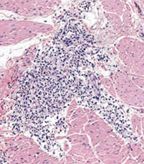Markers Can ID Aggressive Smoking-Associated Bladder Cancer
Researchers have identified bladder cancer markers that can predict which patients may have the most aggressive, fatal type of the disease. It was also discovered that smoking can affect the course of bladder cancer development, leading to more aggressive forms of the disease.
It has been known that smoking can cause bladder cancer. Now, researchers have found that smoking can also affect the course of cancer development, leading to more aggressive forms of the disease. The study also found bladder cancer markers that can predict which patients may have the most aggressive, fatal type of the disease. The researchers found a panel of nine biomarkers that can be used to identify patients who may need more aggressive treatment after surgery, independent of clinical factors and the smoking history of the patient. Clinical factors cannot currently identify patients with particularly aggressive disease.

Urothelial carcinoma of the urinary bladder invading deep into the muscularis propria; H&E staining; 20× objective
The study highlights the impact and harmful effect of smoking on bladder cancer prognosis. The results are published in Cancer.
“Smoking has been known to cause bladder cancer,” said Richard J. Cote, MD, of the University of Miami Miller School of Medicine, one of the lead authors of the study. “This study now shows smoking intensity can also affect the outcomes of patients with bladder cancer following surgery and chemotherapy.”
Anirban Mitra, MD, PhD, of the Keck School of Medicine of the University of Southern California, Dr. Coe, and colleagues analyzed primary bladder tumors from 212 patients recruited through the Los Angeles County Cancer Surveillance Program. Patients were also interviewed on their smoking habits.
The researchers analyzed mutations in various molecular pathways including angiogenesis and apoptosis. Specifically, APAF-1, E-cadherin, and p53 alterations were individually associated with a poor prognosis that was statistically significant. The researchers immunohistochemically profiled patients for E-cadherin alterations, vascular endothelial growth factor (VEGF), p21, p53, cyclooxygenase-2 (COX-2), BCL2, BAX, apoptotic protease-activating factor 1 (APAF-1), and caspase 3.
Patients who had alterations in six to nine of the biomarkers identified had extremely poor outcomes.
“Some of the markers in this study, p53 and VEGF for example, have been previously identified as affecting the biology and aggressiveness of other cancers,” said Cote. “Their alterations have been observed in patients with lung cancer, including those patients whose cancer was associated with smoking.”
Of the clinical and pathological characteristics, only smoking intensity and pathological stage of the cancer were statistically significant in relation to patient outcomes. Increased duration of smoking and the number of cigarettes smoked per day were associated with a worse bladder cancer prognosis (P < .001 and P = .003, respectively).
Adding the nine markers and smoking intensity to a model that included clinical and pathological characteristics increased the accuracy of the model from 75.6% to 85.4% (P < .001).
According to Cote, bladder cancer is one of the most expensive malignancies to treat. Bladder cancer is the sixth most common cancer in the United States.
“This study identifies a molecular signature that is unique to every patient and can personalize their treatment once their cancer is diagnosed,” said Cote. This is the first study, according to the researchers, that has incorporated both molecular markers and the influence of smoking on these markers. Nor did previous studies combine a large panel of biomarkers into models.
Validation of the biomarker model is still necessary. “We are working to validate the prognostic value of the nine identified markers as part of single- and multi-institutional efforts involving more bladder cancer patients,” said Cote.